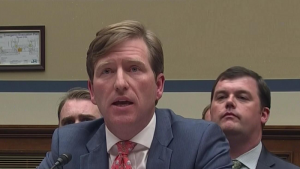During today’s Senate Homeland Security Committee Hearing, both Committee Chairman Ron Johnson, R-Wis., and Cybersecurity and Infrastructure Security Agency (CISA) Director Chris Krebs agreed that CISA’s role is largely similar to the Federal Emergency Management Agency’s mandate.
The Cybersecurity and Infrastructure Security Agency (CISA) released its #Protect2020 Strategic Plan for election security Feb. 7, one day after the Government Accountability Office (GAO) slammed the agency’s election security preparedness.
The Department of Homeland Security’s (DHS) Cybersecurity and Infrastructure Security Agency (CISA) is not yet well-positioned to secure nationwide election infrastructure before the 2020 election cycle, according to a Feb. 6 Government Accountability Office (GAO) report.
North Carolina Governor Roy Cooper announced Feb. 4 that Tracy Doaks will become the state’s new secretary of the Department of Information Technology (DoIT) and CIO.
The 2020 election cycle got off to a rocky start with the Feb. 3 Iowa Caucus plagued with technical trouble, and a Feb. 3 report from McAfee only doubles down on election technology concerns.
Orange County, Fla., announced Jan. 28 that Alexa users now have access to the “Ask Orange County Government” skill. Alexa, Amazon’s voice commanded virtual assistant, can help residents connect with government services through Orange County’s 311 service. In a statement, the county government noted it is the first in Florida to develop an Alexa skill.
An apparent series of interconnected failures surrounding the use of a key vote-tallying phone app – plus delays associated with a phone-reporting backup system – derailed the reporting of the Iowa Democratic Caucus results last night, even as more states and localities are preparing to add app technologies to some aspects of their election processes.
With today’s Iowa Caucus, the long slog to the 2020 Election is officially underway. In preparation for the General Election this November, West Virginia will become the first state to allow people with disabilities to vote with their smartphones.
Witnesses at today’s House Communications and Technology Subcommittee hearing agreed that closing the digital divide and increasing internet adoption in the U.S. requires a combination of private sector competition, and financial and regulatory help from the Federal government.
Reps. Peter DeFazio, D-Ore., Frank Pallone, D-N.J., and Richard Neal, D-Mass., released a five-year infrastructure investment framework Jan. 29 with $98 billion dedicated to broadband initiatives.












